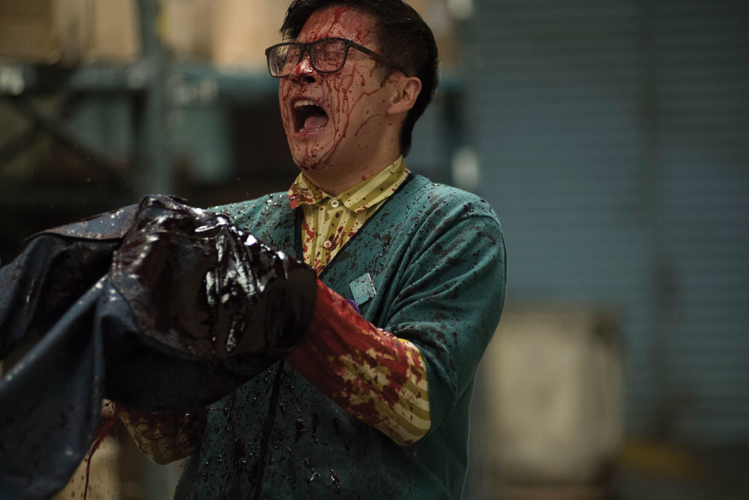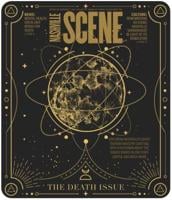
Wojnarowicz
It’s a very political week here in the Primal Stream. The vaccine is being administered to many more Nashvillians, which is a relief. But it’s also a time to figure out where to put your energy when it’s not immediately focused on staying as alive as possible. “Anger is an energy,” John Lydon said during the time before his Trumpist rebirth, and he wasn’t wrong then. (Nor was he wrong in the 1988 Public Image Ltd tune “Disappointed” — he just didn’t let us know he was addressing his future self.) And this is an unconventional pairing of films: a visceral documentary about art and AIDS, and a vicious bouquet of murderous pants. But so is life. As always, look back at past issues of the Scene for more streaming recommendations: March 26, April 2, April 9, April 16, April 23, April 30, May 7, May 14, May 21, May 28, June 4, June 11, June 18, June 25, July 2, July 9, July 16, July 23, July 30, Aug. 6, Aug. 13, Aug. 20, Aug. 27, Sept. 3, Sept. 10, Sept. 17, Sept. 24, Oct. 1, Oct. 15, Oct. 29, Nov. 5, Nov. 11, Nov. 26, Dec. 3, Dec. 17, Jan. 6, Jan. 21, Jan. 28, Feb. 4, Feb. 11, Feb. 18, Feb. 25, March 11.
Wojnarowicz via the Belcourt’s virtual cinema
The full title of this film — Wojnarowicz: Fuck You Faggot Fucker — lets you know upfront that the journey is going to be confrontational. And though the late artist David Wojnarowicz was for a time best known because of a connection to the single cover and video for U2’s plaintive and reconciliatory “One,” there are few social and political ills that don’t find their way into the crosshairs at some point during this bracing and essential document of the 20th century. What’s most impressive is how director Chris McKim and the World of Wonder production team of Bailey and Barbato use the work and audio recordings of Wojnarowicz, who died in 1992 from complications from AIDS, to find the through lines that tie it all together — how homophobia and economic stratification and inequality all feed the same machine that devours the other, and how very little has actually changed in the intervening decades.
A painter, photographer, recorder, documentarian, actor (alongside Karen Finley and Nick Zedd!), sculptor, sex worker, musician (his time in the No Wave band/experience 3 Teens Kill 4, back in print via the lovable freaks at Dark Entries Records, is essential), and thorn in the side of complacency, David Wojnarowicz fled an abusive father into a world that desperately needed him. Finding a nurturing space in decaying downtown New York City and with genius photographer Peter Hujar, Wojnarowciz was the kind of artistic polymath who just kept finding new ways to explore his corrosive rage at the illusions American society had built itself on. He was a first-person chronicler of how the 1980s saw the government abandon its gay population to the ravages of a pandemic still with us today — mediated and managed by medication, and fundraising, and forgotten red ribbons, but still with us in the world.
There’s an amazing little roundabout in the last third of the film that explores how the reactionary habits of legislators like Jesse Helms found a new strength — not through continued legislation, where they simply cut away at arts funding in general until there was barely anything left, but via the donors who fund museums and arts centers. If the folks who sign the checks don’t want art of a certain type, well … just look around. Economics is the ultimate form of censorship, which is exactly how the powers that be want it. (Look at what’s happened to the Scene’s alt-weekly brethren LA Weekly, or to the reanimated corpse of The Village Voice.) It oversees hand-in-hand with the obscene money that greases the gears of the art world, where art auctions become their own kind of cryptocurrency. (What Christie’s just did with Man Ray is merely the most egregious of examples.) It’s a dark, dark time when so many forms of organized power are focused on stripping physical art away from its meaning, and this film is like a resonant scream into the back of the skull. This is essential viewing for everyone, especially people who maintain they can’t handle it. It is utterly impossible to look around and not hail David Wojnarowicz as a prophet who saw exactly what was happening.

Slaxx
Slaxx via Shudder
There is an ideological and aesthetic continuum for this movie (and any movie that wants to tackle a “ridiculous” concept). At one end are the gritty, deeply political exploitation films of Larry Cohen that linger in the back of the subconscious decades after their release. At the other end of that continuum are the disposable “Made for Syfy” films, which can offer moments of genuine subversion or wit, but are hamstrung by indifferent effects work and disappear in the glut of quantity. So Slaxx is doing its thing, delightfully and openly Canadian (not just in terms of accents and funding). Big-box clothing retailer CCC, known for its fair-trade manufacturing and large-format Benetton-style ad philosophy, is about to launch the SuperShaper, a new line of jeans that will supposedly change the world as we know it.
Of course, they’re right about these jeans changing the world, but it’s not because of their ability to conceal and redistribute assfat or similar bulk. When the opening sequence has an Indian child harvesting experimental cotton near giant threshers, you can imagine where we’re heading. At its best, Slaxx is The Mangler for the 2020s — a possession narrative playing out as a microcosm of socioeconomic warfare. It’s not hard to pick up on the hypocrisy of upper-middle fashion, where bureaucracy and insecurity have every employee using passive aggression and whatever corporate policy minutiae they can against everyone else around them. This store is a toxic environment long before the murderpants show up. And when those pants do show up, they’re like a rampaging id bent on the annihilation of capitalism. And it’s awesome. If it had just been 80 minutes of denim murderscapes, this would be a frontrunner for the best thing to come out of 2021.
But director Elza Kephart and her co-writer Patricia Gomez make a very deliberate choice that makes the transgressions of the fashion industry queasily specific while shaking the whole film off its axis. Focusing on the horrors that global industries inflict on non-Western workers is correct, and it’s a time-honored inciting event for the murderscape that unfolds. But the way the film utilizes Indian culture feels way off, trying to walk a tightrope between jousting with stereotypes and fulfilling them. Slaxx feels like it’s having an internal dialogue with itself about representation and appropriation (which is a worthy pursuit), but it’s at odds with the momentum it’s built as a disassembling of modern social structures.
Star Romane Denis is appropriately idealistic and effective as a force of moral rectitude. Store manager Brett Donahue is as unctuous and odious as a power-hungry retail manager would be. The rest of the cast is game for the very odd blend of sloppy satire and helpless rage aimed for. It’s no In Fabric (few films are), but Slaxx has moments that stay with you (a base influencer strangled on camera by a pair of jeans going full Famke Janssen-in-Goldeneye, a pallet of jeans sipping at the blood from a pile of workers like gazelles, the grand finale) — even as it occasionally takes off some of its own limbs with the machete it wields on its satirical targets.







